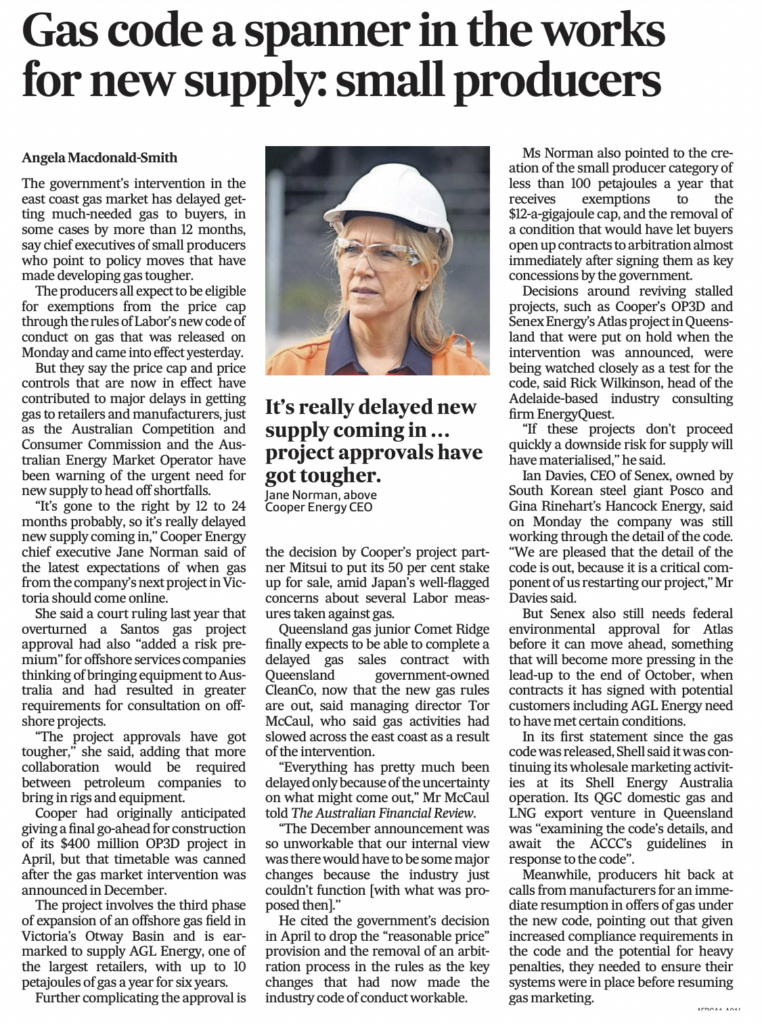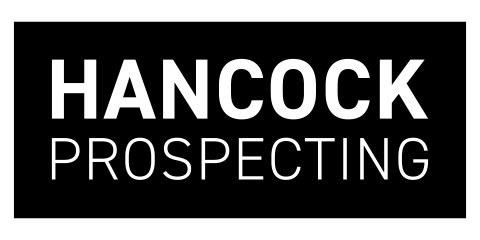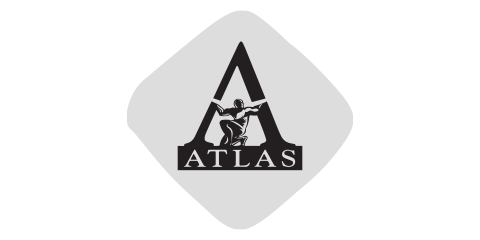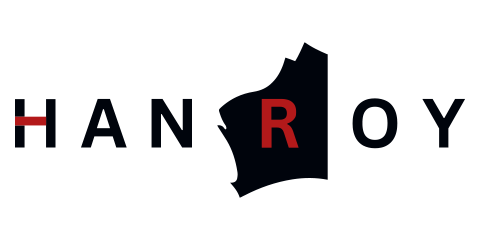

Article by Angela Macdonald-Smith courtesy of The Australian Financial Review.
The government’s intervention in the east coast gas market has delayed getting much-needed gas to buyers, in some cases by more than 12 months, say chief executives of small producers who point to policy moves that have made developing gas tougher.
The producers all expect to be eligible for exemptions from the price cap through the rules of Labor’s new code of conduct on gas that was released on Monday and came into effect yesterday.
But they say the price cap and price controls that are now in effect have contributed to major delays in getting gas to retailers and manufacturers, just as the Australian Competition and Consumer Commission and the Australian Energy Market Operator have been warning of the urgent need for new supply to head off shortfalls.
“It’s gone to the right by 12 to 24 months probably, so it’s really delayed new supply coming in,” Cooper Energy chief executive Jane Norman said of the latest expectations of when gas from the company’s next project in Victoria should come online.
She said a court ruling last year that overturned a Santos gas project approval had also “added a risk premium” for offshore services companies thinking of bringing equipment to Australia and had resulted in greater requirements for consultation on offshore projects.
“The project approvals have got tougher,” she said, adding that more collaboration would be required between petroleum companies to bring in rigs and equipment.
Cooper had originally anticipated giving a final go-ahead for construction of its $400 million OP3D project in April, but that timetable was canned after the gas market intervention was announced in December.
The project involves the third phase of expansion of an offshore gas field in Victoria’s Otway Basin and is earmarked to supply AGL Energy, one of the largest retailers, with up to 10 petajoules of gas a year for six years.
Further complicating the approval is the decision by Cooper’s project partner Mitsui to put its 50 per cent stake up for sale, amid Japan’s well-flagged concerns about several Labor measures taken against gas.
Queensland gas junior Comet Ridge finally expects to be able to complete a delayed gas sales contract with Queensland government-owned CleanCo, now that the new gas rules are out, said managing director Tor McCaul, who said gas activities had slowed across the east coast as a result of the intervention.
“Everything has pretty much been delayed only because of the uncertainty on what might come out,” Mr McCaul told The Australian Financial Review.
“The December announcement was so unworkable that our internal view was there would have to be some major changes because the industry just couldn’t function [with what was proposed then].”
He cited the government’s decision in April to drop the “reasonable price” provision and the removal of an arbitration process in the rules as the key changes that had now made the industry code of conduct workable.
Ms Norman also pointed to the creation of the small producer category of less than 100 petajoules a year that receives exemptions to the $12-a-gigajoule cap, and the removal of a condition that would have let buyers open up contracts to arbitration almost immediately after signing them as key concessions by the government.
Decisions around reviving stalled projects, such as Cooper’s OP3D and Senex Energy’s Atlas project in Queensland that were put on hold when the intervention was announced, were being watched closely as a test for the code, said Rick Wilkinson, head of the Adelaide-based industry consulting firm EnergyQuest.
“If these projects don’t proceed quickly a downside risk for supply will have materialised,” he said.
Ian Davies, CEO of Senex, owned by South Korean steel giant Posco and Gina Rinehart’s Hancock Energy, said on Monday the company was still working through the detail of the code.
“We are pleased that the detail of the code is out, because it is a critical component of us restarting our project,” Mr Davies said.
But Senex also still needs federal environmental approval for Atlas before it can move ahead, something that will become more pressing in the lead-up to the end of October, when contracts it has signed with potential customers including AGL Energy need to have met certain conditions.
In its first statement since the gas code was released, Shell said it was continuing its wholesale marketing activities at its Shell Energy Australia operation. Its QGC domestic gas and LNG export venture in Queensland was “examining the code’s details, and await the ACCC’s guidelines in response to the code”.
Meanwhile, producers hit back at calls from manufacturers for an immediate resumption in offers of gas under the new code, pointing out that given increased compliance requirements in the code and the potential for heavy penalties, they needed to ensure their systems were in place before resuming gas marketing.




